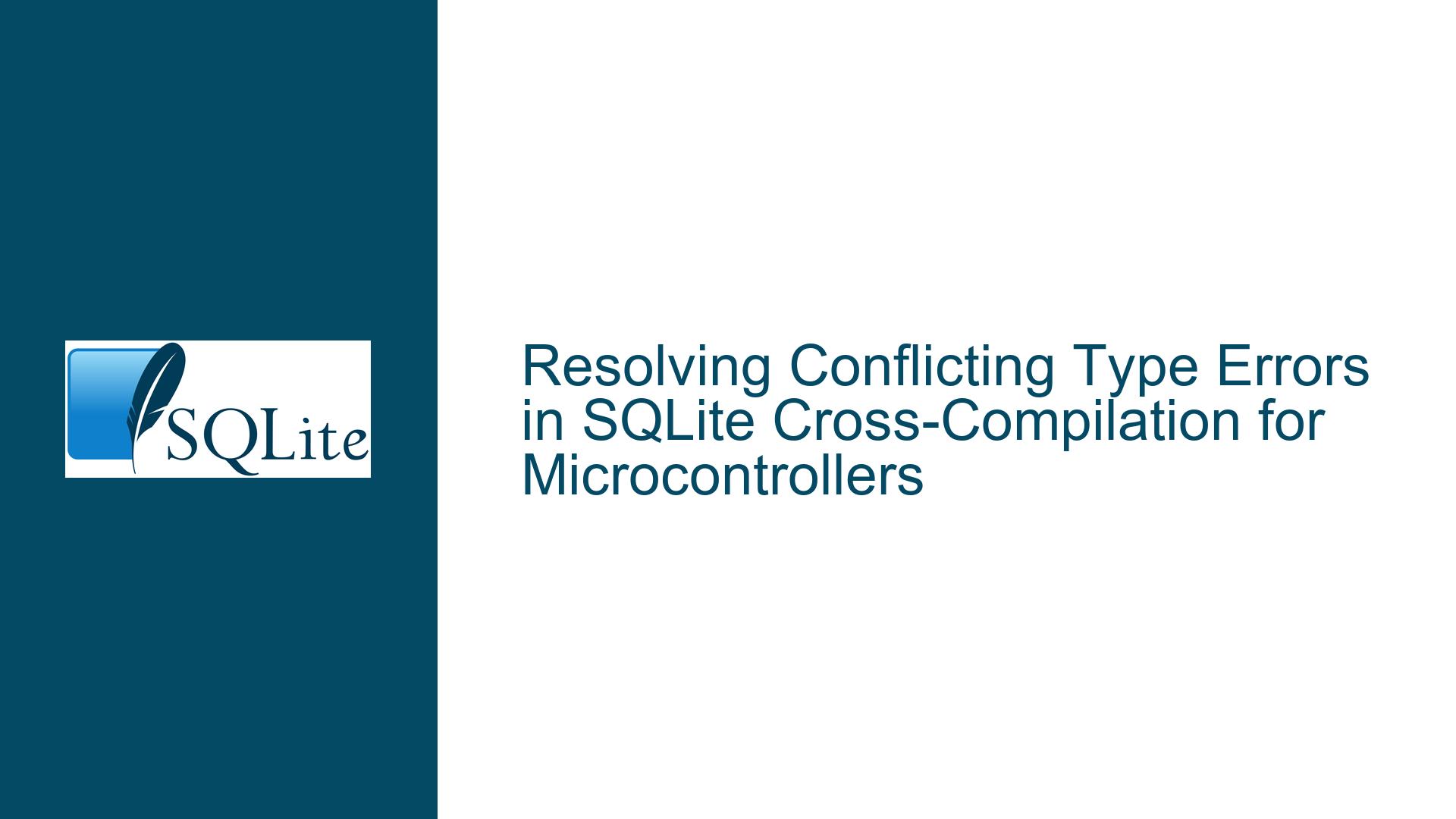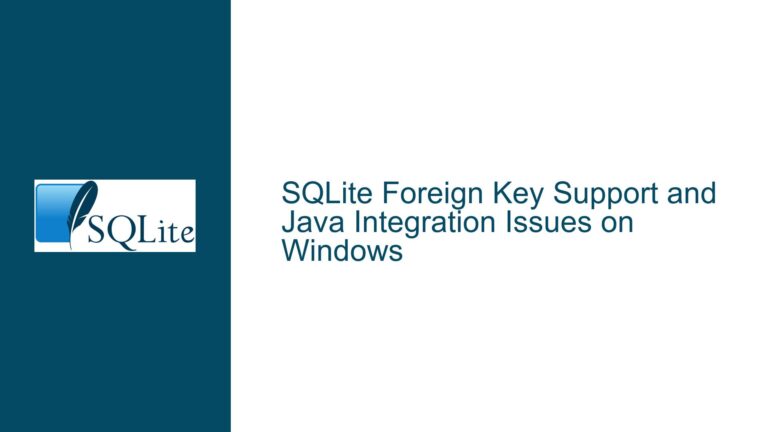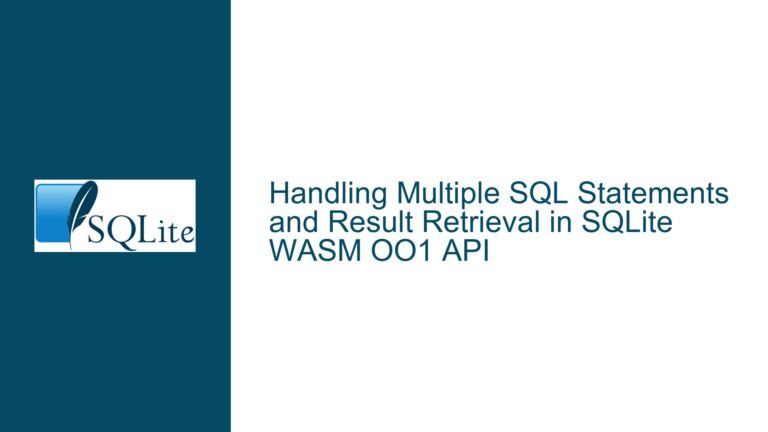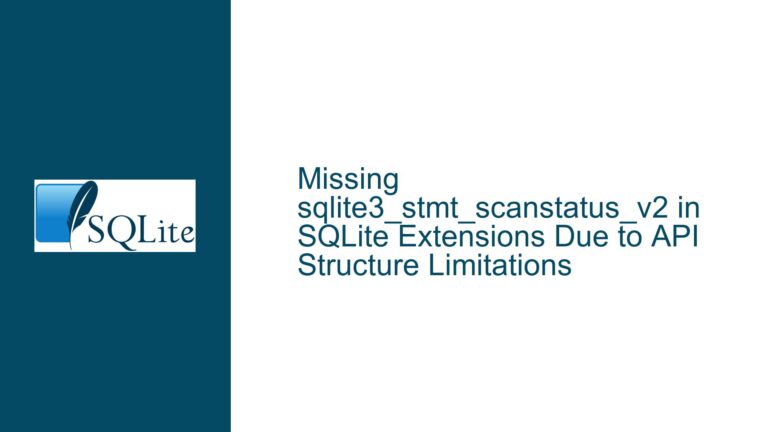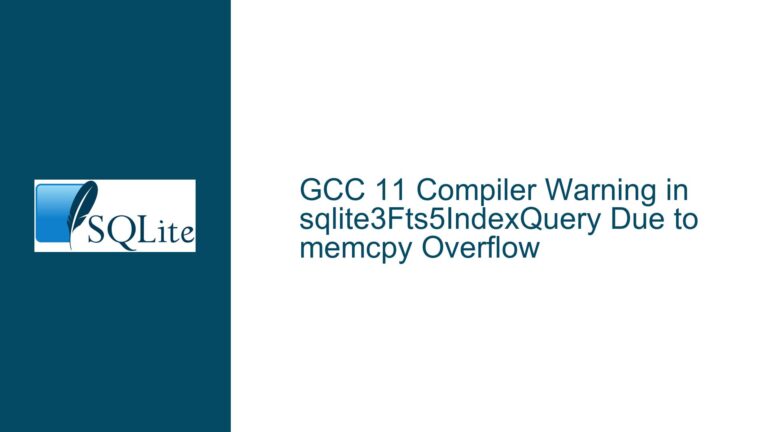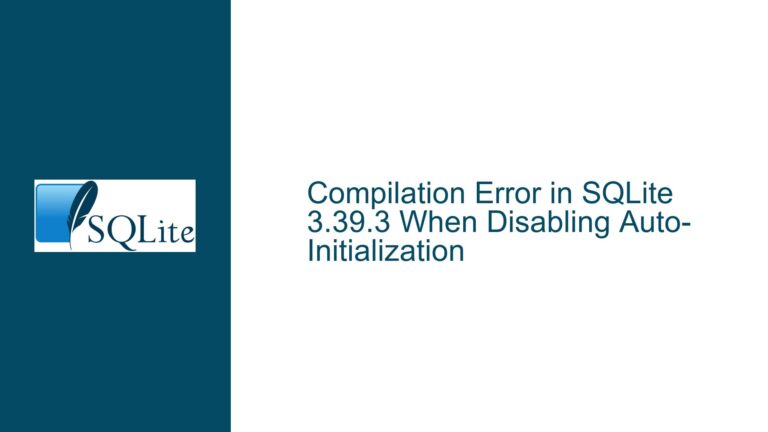Resolving Conflicting Type Errors in SQLite Cross-Compilation for Microcontrollers
Type Mismatch in Function Declarations and Callback Signatures
Issue Overview
The core problem arises during cross-compilation of SQLite for an ARM-based microcontroller, where conflicting type definitions trigger compilation errors. Two specific issues are observed:
Incompatible Pointer Type Warning:
Thesqlite3_trace_v2function insrc/main.cassigns a callback todb->trace.xV2, which expects a function pointer with au32(typedef forunsigned int) as its first parameter. However, the assignment triggers a warning due to a mismatch between the declared type (int (*)(u32, void*, void*, void*)) and the assigned type (int (*)(unsigned int, ...)).Conflicting Function Declaration Error:
Thesqlite3_autovacuum_pagesfunction insrc/main.cis declared with parameters(void*, const char*, unsigned, unsigned, unsigned), but its forward declaration insqlite3.husesu32for the last three parameters. The compiler treatsunsignedandu32as distinct types under certain configurations, leading to a hard error.
These errors stem from inconsistencies in how SQLite’s internal type system interacts with compiler-specific type resolution rules during cross-compilation. The ARM toolchain’s strict adherence to C89 standards (-std=c89) exacerbates the issue by disabling certain automatic type compatibility features.
Root Causes of Type Conflicts in Cross-Compilation
1. Typedef Ambiguity in Cross-Platform Contexts
SQLite uses the u32 typedef (defined in sqliteInt.h as unsigned int) to abstract integer types. However, cross-compilation toolchains may interpret u32 differently based on:
- Compiler Flags: Flags like
-mthumb,-mabi=aapcs, or-std=c89can alter default type promotions. - Toolchain Headers: ARM toolchains often include headers that redefine base types for low-level hardware compatibility.
- Strict C89 Compliance: The
-std=c89flag disables C99-style type compatibility relaxations, making the compiler stricter about typedef equivalence.
2. Callback Signature Mismatches
SQLite’s trace and autovacuum subsystems rely on function pointers with parameters derived from u32. When these callbacks are assigned or declared without explicit u32 usage, the compiler treats unsigned int and u32 as distinct types. For example:
- The
trace.xV2callback insqliteInt.his declared withu32, butmain.cassigns a callback usingunsigned int. - The
xCallbackparameter ofsqlite3_autovacuum_pagesusesunsignedin the definition butu32in the declaration.
3. Compiler Configuration and Flag Interactions
The ARM toolchain’s arm-none-eabi-gcc compiler enforces strict type checking when targeting microcontrollers. Key factors include:
- ABI Compliance: Flags like
-mabi=aapcsenforce ARM’s procedure call standard, which mandates precise type matching for function arguments. - Optimization Flags:
-mcpu=cortex-m4and-mfloat-abi=hardalter register allocation rules, indirectly affecting type compatibility. - C89 Strictness: Older C standards require explicit type matching, whereas C99/C11 allow
unsignedto aliasunsigned int.
Resolving Type Conflicts and Ensuring Cross-Compilation Success
1. Align Function Signatures with Explicit Typedef Usage
Modify function declarations and definitions to use u32 or unsigned int consistently. For the reported errors:
Fix for sqlite3_trace_v2:
Update the trace.xV2 declaration in sqliteInt.h to use unsigned (equivalent to unsigned int in C89):
// Original: int (*xV2)(u32, void*, void*, void*);
int (*xV2)(unsigned, void*, void*, void*);
Fix for sqlite3_autovacuum_pages:
Ensure the callback parameter in main.c matches the sqlite3.h declaration:
// Original: unsigned int (*xCallback)(void*,const char*,u32,u32,u32)
unsigned int (*xCallback)(void*,const char*,unsigned,unsigned,unsigned)
2. Validate Toolchain-Specific Type Definitions
Check how the ARM toolchain defines u32 (if at all) by inspecting its headers or preprocessor output:
arm-none-eabi-gcc -dM -E - < /dev/null | grep -i 'u32'
If the toolchain defines u32 independently, redefine it in SQLite’s configuration:
// Add to sqliteInt.h or a custom header
typedef unsigned int u32;
3. Adjust Compiler Flags for Type Flexibility
Relax strict type checks temporarily to identify problematic areas:
make CFLAGS="-DSQLITE_OS_OTHER=1 -DSQLITE_OMIT_DEPRECATED=1 -std=c89 -fno-strict-aliasing"
The -fno-strict-aliasing flag prevents aggressive type punning checks.
4. Patch SQLite Source Code for Cross-Platform Consistency
Apply the following patch to harmonize type usage across declarations and definitions:
Index: src/main.c
==================================================================
--- src/main.c
+++ src/main.c
@@ -2308,11 +2308,11 @@
** Register a function to be invoked prior to each autovacuum that
** determines the number of pages to vacuum.
*/
int sqlite3_autovacuum_pages(
sqlite3 *db, /* Attach the hook to this database */
- unsigned int (*xCallback)(void*,const char*,u32,u32,u32),
+ unsigned int (*xCallback)(void*,const char*,unsigned,unsigned,unsigned),
void *pArg, /* Argument to the function */
void (*xDestructor)(void*) /* Destructor for pArg */
){
#ifdef SQLITE_ENABLE_API_ARMOR
if( !sqlite3SafetyCheckOk(db) ){
Index: src/sqliteInt.h
==================================================================
--- src/sqliteInt.h
+++ src/sqliteInt.h
@@ -1580,11 +1580,11 @@
int nVDestroy; /* Number of active OP_VDestroy operations */
int nExtension; /* Number of loaded extensions */
void **aExtension; /* Array of shared library handles */
union {
void (*xLegacy)(void*,const char*); /* mTrace==SQLITE_TRACE_LEGACY */
- int (*xV2)(u32,void*,void*,void*); /* All other mTrace values */
+ int (*xV2)(unsigned,void*,void*,void*); /* All other mTrace values */
} trace;
void *pTraceArg; /* Argument to the trace function */
#ifndef SQLITE_OMIT_DEPRECATED
void (*xProfile)(void*,const char*,u64); /* Profiling function */
void *pProfileArg; /* Argument to profile function */
5. Rebuild with Clean Configuration
After patching, rebuild with a clean slate to avoid cached object files causing residual errors:
make clean
./configure [original flags]
make [original CFLAGS]
6. Verify with Alternative Compiler Flags
If errors persist, test with newer C standards (e.g., -std=gnu99) to leverage relaxed type rules:
make CFLAGS="-DSQLITE_OS_OTHER=1 -DSQLITE_OMIT_DEPRECATED=1 -std=gnu99"
7. Audit Cross-Compilation Toolchain Headers
Inspect ARM toolchain headers (e.g., stdint.h, arm-none-eabi/include/) for conflicting u32 or uint32_t definitions. Use -nostdinc to exclude system headers if necessary.
8. Leverage SQLite Configuration Options
Disable non-essential features to reduce type dependency surfaces:
./configure --disable-threadsafe --disable-load-extension --disable-rtree
By systematically addressing typedef inconsistencies, aligning function signatures, and validating toolchain behavior, the conflicting type errors can be resolved, enabling successful SQLite builds for microcontroller targets.
